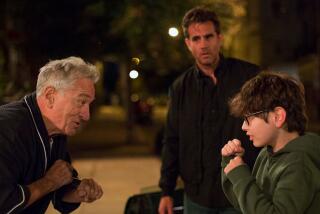Sam Goldwyn Jr.--’Book Is a Testament to Human Survival’
- Share via
Sam Goldwyn had had two biographies written about him in his lifetime and didn’t like either one, his son Sam Goldwyn Jr. says. The motion picture pioneer wanted one written--after his death, so it could be good, and honest.
“I went to Michener, who declined, and to Fawn Brodie (the late UCLA historian and biographer of Thomas Jefferson). We almost agreed, then she decided to do Nixon instead,” Goldwyn says. When Scott Berg’s biography of Maxwell Perkins appeared, Goldwyn was particularly impressed by Berg’s ability to place Perkins in the larger context of his times and to keep him the central figure, not overshadowed by Hemingway and the other major authors Perkins was editing.
“The book was a gamble for Scott. Doing a Hollywood book is always looked down on in literary circles. I think what Scott has done is not the book people expected. I’m a prime source, but it’s not an as-told-to book at all. It doesn’t pull any punches, but it’s not mean-spirited either. I understood from the beginning that I couldn’t have a role as a producer, I just had to be a good interviewee.”
The book was three years longer in the writing than Goldwyn and Berg expected it to take. “He spent a year and a half with Willie Wyler alone, and a lot of time in hospital rooms. I drove him crazy to finish it.”
In the end, Goldwyn says, “The book is a testament to human survival, as I always hoped it would be. The Jews from Eastern Europe who founded Hollywood arrived as immigrants, just as immigrants are arriving today, not knowing the language, having to fight to survive. It made my father a different person from those who didn’t have the advantage of the struggle, but I don’t find him unsympathetic in the book.”
What he remembers most vividly from life with father, Sam Jr. says, “is the day when a movie would be paid off, and my mother’s fears that a movie wouldn’t be paid off.” Unique among producers, Goldwyn financed all his own films, and burning the mortgage, symbolically speaking, was more than a matter of pride.
“My father used to say, if you’re right more than 51% of the time, you’re a genius.” As a boy, watching films being made was enviable fun. Watching them being accepted or rejected by the public was its own learning experience. “My father believed strongly, and taught me, that you can’t let yourself get too high on a success or too low on a failure. In this volatile business, that’s useful to know.”
Still the failures hurt. Sam Goldwyn Sr. was baffled and dismayed by the commercial and critical rejection of “Porgy and Bess,” his last film. “He always thought it was a step forward; he didn’t realize how fast times had changed.” Ironically, a film produced by Goldwyn Jr., “Cotton Comes to Harlem,” did more than any other to launch a short-lived flurry in black-themed movies that found large crossover audiences.
Reading the book, Goldwyn says, “is painful for me. It deals with relationships among people I was very fond of--my mother, my father, George Cukor. People are fascinated that three such disparate people should share a common grave.
“My father was not comfortable working with very articulate people. He and Willie Wyler got along because neither of them was very articulate. But George was articulate and I think they both knew that there’d be trouble if they tried to work together. But George and my mother were loving friends almost all of their adult lives.”
On Monday an exhibition, “The Goldwyn Age of Hollywood,” opens at the Goldwyn Branch of the Los Angeles Public Library in Hollywood, commemorating National Library Month as well as the publication of the Berg biography.
On Wednesday “Wuthering Heights,” withdrawn from circulation five years ago, opens again in Los Angeles to celebrate the 50th anniversary of its first release. Produced by Sam Goldwyn and directed by William Wyler, it remains a work of Hollywood at its most unabashedly romantic, and it bears out another piece of wisdom passed from Sam Sr. to Sam Jr.: “All the audience cares about is what you put up on the screen.”
More to Read
Sign up for our Book Club newsletter
Get the latest news, events and more from the Los Angeles Times Book Club, and help us get L.A. reading and talking.
You may occasionally receive promotional content from the Los Angeles Times.







